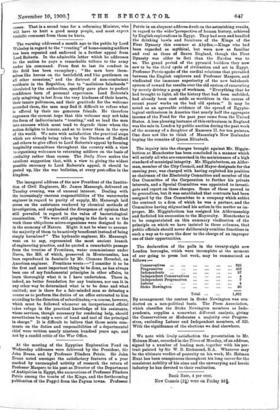The inaugural address of the new President of the Institu-
tion of Civil Engineers, Mr. James Mansergh, delivered on Tuesday evening, was of unusual interest. Dealing with the increasingly onerous responsibilities of 'the waterworks engineer in regard to purity of supply, Mr. Mansergh laid stress on the assistance rendered by chemical methods of investigation, and emphasised the divergence of opinion that still prevailed in regard to the value of bacteriological examination. " We were still groping in the dark as to the work these ubiquitous micro-organisms were designed to do in the economy of Nature. Might it not be wiser to assume the majority of them to be actively beneficent instead of being simply harmless P" The hydraulic engineer, Mr. Mansergh went on to say, represented the most ancient branch of engineering practice, and he quoted a remarkable passage from the treatise of Frontinns, water commissioner under Nerva, the MS. of which, preserved in Montecassino, has been reproduced in facsimile by Mr. Clemens Herschel, an American engineer. Frontinus wrote :—" I consider it to be the first and most important thing to be done, as has always been one of my fundamental principles in other affairs, to learn thoroughly what it is I have undertaken. There is, indeed, no better foundation for any business, nor can it in any other way be determined what is to be done and what omitted; nor is there for a fair-minded man so debasing a course as to perform the duties of an office entrusted to him according to the direction of subordinates,—a course, however, which must he followed whenever an inexperienced official takes refuge in the practical knowledge of his assistants, whose services, though necessary for rendering help, should nevertheless be only a sort of hand and tool of the principal in charge." It is difficult to believe that these acute com- ments on the duties and responsibilities of a departmental chief were written nearly nineteen hundred years ago, and not by a candid critic of the War Office.






































 Previous page
Previous page